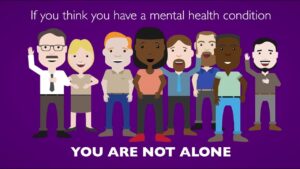In this article, we’ll discuss what is a mental health disorder and its symptoms, causes, and treatments. We’ll also look at some of the best ways to identify this type of mental illness. Read on for more information! Listed below are some of the most common mental health disorders. These disorders can affect a wide range of people, and their treatments may differ based on the specific disorder. But, if you suspect that you’re suffering from one, you can begin your journey toward recovery by assessing your symptoms and discussing the disorder with a mental health professional.
Treatments for mental health disorders
The list of treatments for mental health disorders is extensive and often combines several types of therapies. Many psychological illnesses are complex and involve several components, including biological, cognitive, and social welfare components. Effective public mental health intervention must address all of these components in order to improve a person’s quality of life. The following list highlights some of the common therapies used to treat mental illnesses. These are not meant to be exhaustive, and you should seek the advice of a qualified medical professional.
Neurodevelopmental disorders include problems with emotional and behavioral development, and may begin before the child reaches grade school. They include autism spectrum disorder, attention-deficit/hyperactivity disorder, and learning disorders. Psychotic disorders affect the brain and cause detachment from reality, resulting in hallucinations or disorganized thinking. Examples of this disorder include schizophrenia. Other disorders involve repetitive thoughts or behaviors and include obsessional-compulsive disorder and post-traumatic stress disorder.
Medication may be the best treatment for many people with mental health disorders. Medications are effective, but they do have side effects. Medication is the most common method of treatment, but sometimes you may benefit from psychotherapy as well. Therapy is an important part of treating mental illnesses, and a trained professional can teach you coping strategies to cope with the symptoms. Generally, a physician can recommend a course of treatment based on a diagnosis.
Medication is the most common form of treatment for mental disorders. Antidepressants and antipsychotics work by altering certain chemicals in the brain. You must take the medication according to the prescription, and never stop taking medication without your healthcare provider’s consent. Psychotherapy is an alternative treatment option for many people suffering from mental disorders. Psychotherapy is a type of therapy where a trained professional guides the patient through a series of steps that may help them manage symptoms.
Psychiatric medications may include tricyclic antidepressants and antipsychotics. These drugs, which are used for bipolar disorders, are primarily used to treat depression and are sometimes combined with antidepressants. Older antipsychotics, like clozapine, are often used for psychotic disorders and behavioral problems, but may also be prescribed to treat depression. Psychotherapy is an effective treatment option, and it can be covered by your health insurance. The earlier you seek treatment, the sooner you can get started.
Signs and symptoms
When signs and symptoms of mental illness start to affect your life, you should seek help from a qualified healthcare provider. While you may be able to identify some signs of a mental illness, others may be harder to detect, particularly if the symptoms interfere with your day-to-day activities. Fortunately, almost all mental health disorders can be treated, and early intervention is crucial to prevent a serious mental illness from progressing to a psychotic episode.
Although everyone undergoes ups and downs in their mental health, signs of a serious illness may be more pronounced for some people than others. These changes can be behavioral, or they can be physical. However, if you notice that a loved one exhibits several of these symptoms, it may be time to seek help. Mental illness affects up to 44 million people in the U.S. each year. There is no simple test to diagnose mental illness, so it is important to know your loved one’s behavior and seek out a professional if you notice changes.
The early signs of a mental health disorder may be difficult to detect, especially if they occur at a young age. Many of these illnesses are gradual and do not manifest themselves for several months or years at a time. While the illness may not appear until a person reaches adulthood, early treatment can prevent or delay a major mental health condition from developing. Early intervention may help you make a better decision and seek help earlier.
There are many different ways to treat a mental illness, and treatment methods may include medication, therapy, or lifestyle changes. Depending on your specific condition and the severity, the appropriate treatment will depend on your preferences, and goals for recovery. A person may require hospitalization for intensive treatment if they have a serious mental illness. Mental health hospitals offer counseling and social support for patients. They can also provide education and help the patient learn to manage their condition.
Some people with a mental health disorder may be isolated and refuse to socialise, sleep excessively, or have a variety of other symptoms. Some people may even isolate themselves from their family and friends and do not engage in daily tasks. Others may experience extreme mood swings and experience difficulty understanding and relating to others. These symptoms are indicative of a mental health disorder and should be addressed immediately. You may even suffer from one or more of these conditions.
Causes
Several factors contribute to mental health disorders, such as employment difficulties, migration problems, socioeconomic inequalities, lack of social cohesion, and extreme stress. Additionally, these conditions are often associated with substance abuse and poor relationships. Untreated mental illness may lead to physical problems, such as gastrointestinal ulcers. If left untreated, mental health disorders may lead to a variety of medical complications, including cardiovascular disease and stroke.
Various types of mental health disorders affect individuals of all ages. Attention deficit hyperactivity disorder, for example, affects children and adults, and is characterized by excessive activity and inability to focus. Anxiety disorders, on the other hand, can cause intense fear and can be difficult to cope with. Some of these conditions can be life-altering, which is why they are essential to recognize early on. The best way to detect a mental health disorder is to discuss it with a doctor.
Some mental health disorders are hereditary. If you have a close relative with mental illness, your chances of developing this disorder are high. But it’s important to note that there are many other causes for mental illness. Genetics play a role in some, as well. Some genes are more likely to be prone to the disorder than others. In other cases, environmental exposures during childhood are linked with the condition. Certain infections can also affect the brain’s ability to process signals. Streptococcus bacteria, for example, has been linked with obsessive-compulsive disorder in children.
Some causes of mental illness are unavoidable, such as a loss of a job, traumatic experience, or severe life stress. For people with these conditions, it may be hard to distinguish reality from illusion. Symptoms often include an inability to concentrate, changes in sleep patterns, and loss of interest in activities. People with these conditions may also experience feelings of anger or extreme sadness throughout the day. It’s crucial to seek medical attention if you suspect a loved one of suffering from a mental health disorder.
There are a variety of different reasons for mental illness, including gender disparities, a lack of education, and economic injustices. The prevalence of depression and anxiety in society is a major concern. A changing attitude towards mental illness is necessary to combat this epidemic. But we should be clear that there are genetic and environmental causes of mental health disorders, as well as the conduct of honour-killing. These factors are not completely deterministic, and it is important to seek proper treatment and support if symptoms persist.
Treatments
There are many different types of treatments for a mental health disorder. Depending on the disorder, a treatment may consist of therapy and medicines. Some people with serious mental disorders require more intensive treatments, such as medications, social support, or education on managing their disorder. If a person’s condition is particularly severe or dangerous, they may be admitted to a psychiatric hospital. Depending on the severity of the disorder, psychiatric hospitals may provide 24-hour care or residential treatment. Some treatments are intensive, such as psychotherapy, while others are aimed at reducing symptoms.
Psychotic disorders include those characterized by detachment from reality and disrupted functioning. These include schizophrenia and autism spectrum disorders. Other types of mental illnesses are associated with detachment from reality. Related disorders include preoccupations, repetitive behaviors, and irrational thoughts. Bipolar disorders include episodes of mania and depression. The diagnosis for each of these disorders depends on the severity and type of disorder. These treatments are often aimed at alleviating symptoms rather than resolving the underlying problem.
Untreated mental illnesses can cause unnecessary disability, substance abuse, and homelessness. They can even result in suicide or other egregious behaviors. Unfortunately, there is no cure for mental illnesses, but the good news is that they are treatable and most people will experience some degree of improvement once they begin a treatment program. There are many ways to treat mental health disorders, and the most successful ones are highly effective. The most effective treatments can relieve symptoms of more than 70 percent of people.
Psychological treatments for mental illness can include a combination of different types of medications. In some cases, medication is the primary treatment for a mental illness, but therapy is also an important part of managing a disorder. Depending on the severity of the condition, a combination of therapies is used to treat symptoms. The best way to understand the medication that works best for you is to discuss your medical condition with a mental health care professional.


